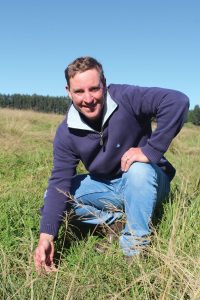Preston Farm, home to La Petite France dairy, is situated just outside Howick in the KwaZulu-Natal Midlands. It is the picture of countryside perfection, with cattle grazing in lush, flower-dotted pastures, and pathways winding between old oak trees and milking sheds.
The renowned Karkloof Farmers’ Market can also be found at the entrance to the farm, providing patrons with a tranquil view of the surroundings as they tuck into cheese produced from the milk of cows just a stone’s throw away.
Preston is owned and run by Grant Warren, who says that while his family farm is partially set up to allow for a country lifestyle, it is nevertheless a business that needs to remain financially viable.
But in the dairy industry, where margins are low, this isn’t easy to achieve.
“The number of smaller dairies in South Africa is dwindling, because you can’t produce cheap milk on a small scale,” he says, adding that while he tries to keep costs down, he cannot get away from overheads such as electricity, labour and insurance premiums.

“Milking is a 24/7 business, so I need multiple shifts requiring 10 permanent employees each. My staff are happy, motivated and good at what they do, and this makes it all work. Although it would make financial sense to buy in my milk, I’d lose control of what’s in it.”
Warren’s milk is produced by a herd of Jersey and Jersey-Swedish Red cows that feed solely on pasture. Each cow produces an average of 16ℓ/day in summer, and while Warren notes that this is below the industry average, he doesn’t push his animals to produce more by feeding them concentrates.
“We measure milk production, so we know who the underperformers are, but we focus more on quality than quantity. The nutritional content of the products is also important to me, and this is dependent on the cows’ diet. If they were pushed to produce, and given feed such as grain, their milk would have lower nutritional value.
“Our milk has far higher levels of omega- 3, antioxidants and vitamins, because the cows are in a natural grazing system where stress is minimal,” he explains.
The milk also has a butterfat and protein content of 4,5% and 3,8% respectively.
An optimal herd
Warren had plans to study law. But after he completed his schooling, his father fell ill and needed help on the farm. In 1990, therefore, he took a gap year to join his father on what was still the original smallholding, which had only about 20 Jersey cows.
His time spent there sparked his interest in farming as both a lifestyle and business opportunity, and when he eventually did go off to study, he changed his focus to horticulture.
However, returning to the farm to put what he had learnt into practice was challenging, and with one small tractor as his only equipment, he struggled to get his vegetable concern going.
“My first cabbage crop paled in comparison to the weeds. I realised that I needed economies of scale to make it work, but that without additional land, it would be difficult,” he says.
He then turned his attention to the Jerseys, where changes were also needed if the dairy was to be a success. He decided to add Swedish Reds to the herd, as this robust breed has a good milk yield and produces decent-sized calves, should bulls need to be sold.
“When you sell a Swedish Red bull calf, you get nearly twice as much as you would for a ‘skinny’ Jersey bull calf. The Swedish Reds are also easy to manage, don’t have calving problems, and are far less fickle than Jerseys. A herd of 120 cows is tough for me to manage on my own, but too small to justify an extra salary, so having cattle with fewer issues is important,” says Warren.
Today, the herd comprises about 25 purebred Jerseys, with the rest made up of Swedish Red-Jersey crosses. Warren uses sexed semen to eliminate the problem of surplus bull calves, and calving is spread throughout the year to ensure a continuous supply of milk.
The cows are not milked during the two months prior to calving, and are returned to the breeding cycle two months after calving.
His lower-quality cows are inseminated with Angus semen, run with the dairy cows on pasture, and sold as veld-raised beef at maturity.
Production management
Since he prefers to mimic natural conditions as far as possible, Warren limits interventions on his pastures, allowing soil biology to flourish and nutrient-rich grass to grow as a result.
The kikuyu and clover are supplemented with perennial rye in summer and annual rye in winter, which provides the cows with a good source of protein.
The pastures are under pivot irrigation and receive minimal applications of fertiliser. In fact, Warren is phasing out fertiliser, as the pastures are benefitting from the grazing over time. Compost and cow manure are also added to the pastures to build up the soil.
The cows are rotated between camps as needed and Warren keeps supplementary feeding to a minimuum. Licks are reserved for dry cows as an aid for their digestion, and cows in the milking sheds receive a small amount of concentrate with trace elements and vitamins to ensure that they produce nutritionally balanced milk.
According to Warren, the natural lifestyle his cows lead strengthens their immune systems, and they seldom require veterinary intervention. But he adds that obtaining a consistent product is challenging when running a pasture-based herd, as the composition of the milk is influenced by the animals’ changing diet throughout the season.
“European consumers understand and appreciate that the flavour of a cheese changes with the seasons. But local consumers and supermarkets expect the same product throughout the year.”
To simplify production, the milking sheds and cheese factory on Preston Farm are side-by-side, so the milk doesn’t require any cooling or transport; it can be put into production while still warm.
A niche product
Cheese production has not always formed part of Warren’s business; he initially sold his milk to a cheesemaker in the area.
“His French-style cheese was exceptional, but his production was inconsistent, as it was only a side business for him. I took over his business and cheese recipes in 2013,” he explains.
The Camembert and Brie were, and still are, the flagship products, and Warren has since expanded his cheese selection and added a fresh-line range that includes yoghurt, cream, butter, cream cheese, and condensed milk. However, with a shrinking population of artisanal cheese consumers in South Africa, Warren says that marketing and product differentiation have become crucial.
“In addition to the weak economy, the country’s brain drain has also had an effect on the consumption of our cheese, as the pool of people who appreciate and can afford it is dwindling.
“Supermarkets force a supplier’s prices up and down, and without economies of scale, it’s difficult to stay afloat. I’m not big enough to compete with the larger producers, and getting shelf space is a challenge,” he says.
Connecting with customers
This is where Karkloof Farmers’ Market comes in, as patrons have a greater appreciation for pasture-based cheese of artisanal quality.
Warren provides tastings of all his products, and engagement with customers leads to a greater appreciation of what goes into making quality products.
Warren has also introduced labelling on his products to indicate that they are additive-free, the cows are grass-fed, and regenerative agricultural practices are implemented. He admits, however, that the restrictions on what can be put on a label present some challenges, as consumers don’t always know what the terms mean, and are sometimes unable to identify the quality of the products.
“There’s also the issue of price. While many say they support regenerative agriculture, this doesn’t always translate into sales. And if consumers don’t have the money, what can you do?”
Here the COVID-19 pandemic, paradoxically, has helped by bringing about a renewed focus on health and what goes into food. This has revived interest in La Petite France’s products.
The fact that the dairy was declared a champion at the 2020 South African Dairy Championships also attests to the quality of La Petite France cheeses and adds lustre to the brand. If the flavour



